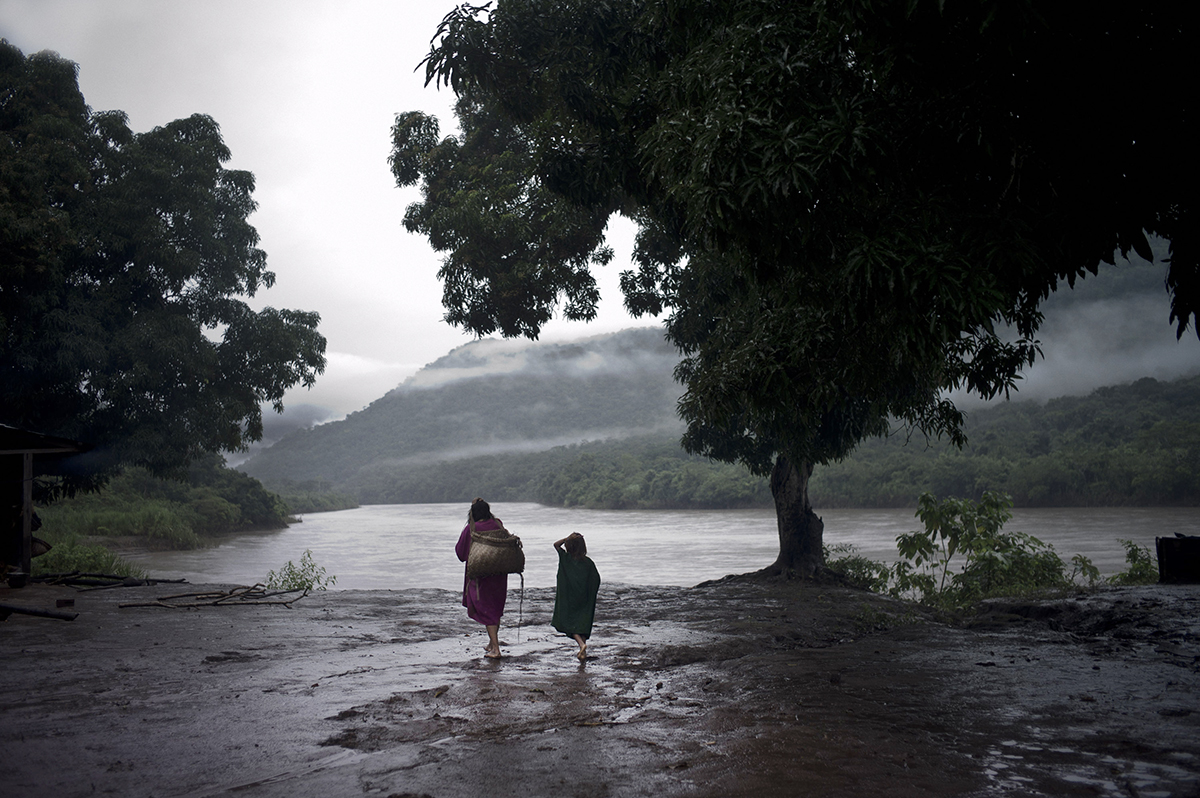Voices of Peru
 Ashaninka women in Tsiquireni, in the shores of Ene River. April 2012. Photo/Tomas Munita
Ashaninka women in Tsiquireni, in the shores of Ene River. April 2012. Photo/Tomas Munita
One day in September, in an unknown and remote location near the border between Peru and Brazil, four Asháninka Indians were killed and dismembered. The group led by Edwin Chota, aged 54, had long been denouncing illegal logging in the region and the lack of commitment by the Peruvian State to demarcate and protect their lands.
The crime brought to light a long list of threats made against Chota and is family over the past 13 years and an equally long list of questions: Why could the authorities not guarantee their safety? What was the involvement of the companies that operate in the region? What is the responsibility of the local government and what type of relationship does it have with these companies?
Maria Esther Mogollón, a human rights activist who currently advises Andean Parliament member Hilaria Supa, answers some of these questions below. For 25 years, she has worked directly with human rights violations in Peru. She led, for example, the movement against the forced sterilization of 320,000 poor indigenous women during the dictatorship of Alberto Fujimori.
She is demanding an effective commitment from the Peruvian government to stopping the violence in the Amazon region and to protecting the rights of indigenous peoples. An arrest warrant has been issued against one suspect, but nobody has been formally charged yet with the death of Edwin Chota, Leoncion Quinticima, Francisco Pinedo and Jorge Ríos.
What is behind the murders?
There is no doubt that it is the illegal logging by companies and their henchmen. We have discovered that Edwin Chota wrote to the authorities warning of the danger facing his family from the loggers he had been fighting for more than 13 years. A few days ago, we were visited at our offices by one of the widows and her daughters, accompanied by the indigenous leader Robert Guimarães, head of the Federation of Native Communities of the Ucayali River and its Tributaries (Feconau). They explained that what they most need is security, since they feel extremely vulnerable given the continued threats.
Is there a link between the illegal logging and the murders?
Yes, there is a direct link. Many companies in the region commit punishable offenses, including illegal logging. They cross indigenous lands and properties and cut down trees that are not included in the contracts. This is often precious wood, for which logging is not permitted. Furthermore, they contaminate the environment. When they are fined by the State and banned from operating, they take no notice. They don’t pay the fines and they threaten and kill people like Edwin Chota and other indigenous leaders.
The authorities have a duty to uphold the law and impose fines and penalties. We have read the details of the case and the complaints filed by Mr. Chota and the other leaders. They date back 13 years! It’s very hard to find out that an indigenous leader was killed with his companions for standing up for his rights for so long. Cruelty and hatred explain a great deal, since the indigenous populations have been continuously threatened and terrorized. In his reports, Edwin Chota listed the names of the sources of the threats. As a result of all this, the signs of corruption also need to be investigated.
 One of the barriers for the Asháninka community to secure the demarcation of its lands is that the territory has been declared a ‘permanent forestry production zone’. Do you think the State could change this?
One of the barriers for the Asháninka community to secure the demarcation of its lands is that the territory has been declared a ‘permanent forestry production zone’. Do you think the State could change this?
It is well known that the indigenous people from areas such as Saweto have been demanding the demarcation of their lands, which are inherited without land titles. There has been little political will from the authorities in the region of Ucayali: they had this mandate but they did not deliver on it.
The government has announced that it will offer support to the indigenous communities for the demarcation of their lands via the Ministry of Culture. President Ollanta Humala also said recently that he will provide reliable lawyers for the indigenous communities, so they are not misled.
Does the State establish mechanisms to safeguard indigenous communities? If not, what kind of mechanisms need to be created?
There are laws that defend indigenous populations in general and indigenous communities more specifically – and these laws need to be enforced. Convention 169 of the International Labour Organization and the UN Declaration on the Rights of Indigenous Peoples complement the Peruvian laws. Congresswoman Hilaria Supa is demanding more protection.
To what degree will the logging companies and infrastructure projects be held accountable for the violence?
I hope the investigations will be swift. Some detained Brazilian suspects have said a number of other culprits are still at large. The widows have indicated that the logging companies are behind it all and this should also be investigated. The full force of the law must be brought to bear, together with the penalties and reparations for the families. This would set a precedent and we hope that it will occur with truth and justice.
In this regard, the Peruvian Commission on Regional Security and Sustainable Development intends to observe and denounce matters related to climate change, human trafficking (particularly children), the rights of indigenous peoples and their ancestral technologies, food security, drug trafficking and regional security.


